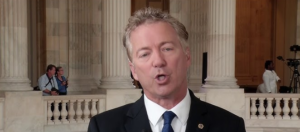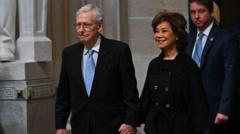Senator Rand Paul (R-KY) advocates for dismantling the Department of Education, asserting that education decisions should be localized and reflecting community needs, amidst a growing frustration over federal mandates.
Senator Rand Paul Calls for Abolishing the Department of Education

Senator Rand Paul Calls for Abolishing the Department of Education
Senator's bold proposal pushes for state control over education while challenging federal oversight.
In a compelling interview with One America News Network’s John Hines, Senator Rand Paul has ignited discussions on Capitol Hill regarding his groundbreaking legislation that seeks to abolish the federal Department of Education entirely. Paul argues that decades of federal oversight and expenditure have failed to enhance student performance, suggesting that education governance should revert to state and local authorities.
“The inefficiencies of a centralized education system have stifled innovation and properly responding to the unique needs of our students and families,” Paul stated. He emphasizes the belief that local educators possess a deeper understanding of their students than any distant federal agency.
Paul’s proposed bill seeks to eliminate the Department of Education, shifting responsibilities and funding to state governments. Proponents of this legislation champion it as a pathway to increased accountability, innovation in teaching methods, and heightened parental engagement in educational frameworks. Conversely, critics raise concerns about the potential for inconsistent educational standards across the country if the federal role is diminished.
As sentiments mount nationally regarding parental rights, educational standards, and federal mandates in education, Paul’s proposal resonates with many Americans. The rising frustration with centralized education policy is fostering a collective call for changes in how education is managed, suggesting that the future of learning may no longer be determined solely by policymakers in Washington, D.C.
“The inefficiencies of a centralized education system have stifled innovation and properly responding to the unique needs of our students and families,” Paul stated. He emphasizes the belief that local educators possess a deeper understanding of their students than any distant federal agency.
Paul’s proposed bill seeks to eliminate the Department of Education, shifting responsibilities and funding to state governments. Proponents of this legislation champion it as a pathway to increased accountability, innovation in teaching methods, and heightened parental engagement in educational frameworks. Conversely, critics raise concerns about the potential for inconsistent educational standards across the country if the federal role is diminished.
As sentiments mount nationally regarding parental rights, educational standards, and federal mandates in education, Paul’s proposal resonates with many Americans. The rising frustration with centralized education policy is fostering a collective call for changes in how education is managed, suggesting that the future of learning may no longer be determined solely by policymakers in Washington, D.C.























